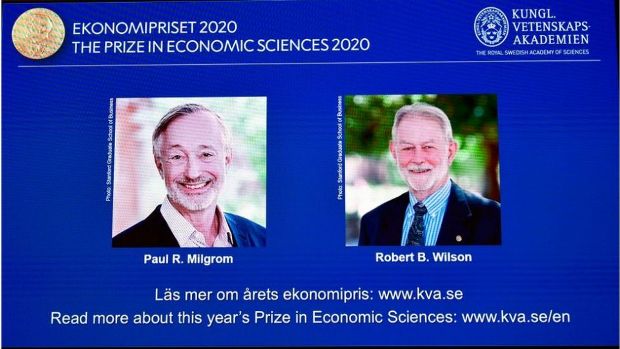US auction theorists win the 2020 Nobel in Economics
By Jeanna Smialek
STOCKHOLM– Two American economists, Paul R. Milgrom and Robert B. Wilson, were awarded the Nobel Memorial Prize in Economic Sciences on Monday (12) for improvements to auction theory and inventions of new auction formats — innovations that have had huge practical applications when it comes to allocating scarce resources.
The pair, close collaborators who are both affiliated with Stanford University, have pioneered new auction formats that governments have since used to auction off radio frequency.
“They haven’t just profoundly changed the way we understand auctions — they have changed how things are auctioned,” said Alvin E. Roth, a Nobel laureate himself who was one of Wilson’s doctoral students. “The two of them are some of the greatest theorists living in economics today.”
Auctions help to sell a variety of products, including art, minerals and online advertising. They can also take on various characteristics: Objects can have a shared, common value for all bidders (such as commodities like oil) or private values that vary across bidders (like art). Bidders may know exactly what the object’s value is, or they may have imperfect information. Bids can be open, meaning everyone can see them, or closed.
Wilson “was the first to create a framework” for auctions of items with a common value, according to the prize committee. In his work, he explained that bidders will offer less than they think the object or service is worth because they are afraid of overpaying — the winner’s curse — even more acutely when they are at an information disadvantage.
But in most auctions, bidders have both common and private values — when buying a house, for instance, shoppers think about both what they personally like about the amenities and what the market value of the home might be.
Milgrom came up with a theory to deal with that mix of common and private value, and he examined how the “winner’s curse” plays out in such instances. He found that people underbid by less in so-called English auctions, in which prices start low and are raised, than in Dutch auctions, where they start high and are reduced.
Yet the pair’s “best-known contribution,” according to the committee, is their work in designing new auction formats for complex situations, including the format that governments now use to allocate radio frequencies to telecom operators.
Radio bandwidth was once allocated by “beauty contests” in which operators made a case for why they should get it — leading to intense lobbying. In the 1990s, the Federal Communications Commission pushed, and Congress permitted, a switch to lottery-based allocation of bandwidth. Initially, though, the new approach also worked poorly: The lotteries were held locally, leading to fractured networks for national operators, among other problems.
Milgrom and Wilson came up with a new format that allowed the simultaneous auctioning of the many geographic areas of the radio spectrum across various bidders, starting with low prices and allowing repeated bids. The FCC adopted the approach in 1994, and found that it allowed them to dole out the radio space while also raising far more money.
The Milgrom and Wilson approach met with such success that many other countries, including Britain, Canada, and Spain, went on to adopt it.
The economists “started out with fundamental theory and later used their results in practical applications, which have spread globally,” Peter Fredriksson, chairman of the prize committee, said in a release accompanying the announcement. “Their discoveries are of great benefit to society.”
Who are the winners?
Wilson was born in 1937 in Geneva, Nebraska, earned both his bachelor’s and graduate degrees from Harvard University, and he is now a professor emeritus at Stanford University.
Milgrom was born in 1948 in Detroit. He completed his graduate education at Stanford, where he received a doctorate in 1979 and where he is now a professor. He, like Roth, was a doctoral student of Wilson’s.
“Bob is a patriarch of a Nobel dynasty,” Roth joked, noting that Wilson also advised the laureate Bengt R. Holmstrom.
Milgrom and Wilson live on the same street in California, a prize committee member, Tommy Andersson, said during a streamed interview following the announcement in Stockholm. He said that neither of them answered their phones at first when they were called about the prize, because it was in the middle of the night on the West Coast. Milgrom was told just minutes before the public announcement.
A groggy-sounding Wilson called into the prize committee’s news conference. Asked if he himself had ever bought something at auction, he at first thought he had not.
“My wife points out to me — we bought ski boots on eBay,” he eventually concluded. “I guess that was an auction.”
-New York Times


